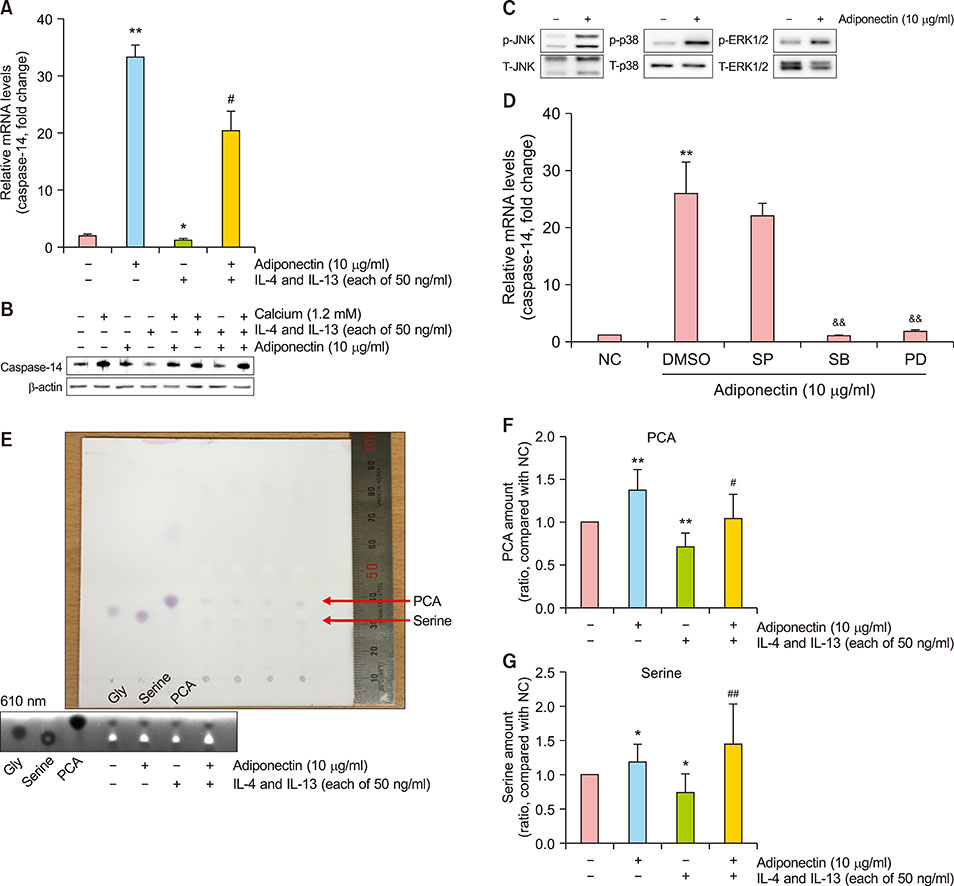Ann Dermatol.
2019 Jun;31(3):352-355. 10.5021/ad.2019.31.3.352.
Adiponectin Promotes Caspase-14 Expression in Normal Human Epidermal Keratinocytes
- Affiliations
-
- 1Department of Dermatology, Inje University Seoul Paik Hospital, Inje University College of Medicine, Seoul, Korea.
- 2Department of Dermatology, Chung-Ang University College of Medicine, Seoul, Korea. drseo@cau.ac.kr, kyky@caumc.or.kr
- KMID: 2444875
- DOI: http://doi.org/10.5021/ad.2019.31.3.352
Abstract
- No abstract available.
Figure
Reference
-
1. Sandilands A, Sutherland C, Irvine AD, McLean WH. Filaggrin in the frontline: role in skin barrier function and disease. J Cell Sci. 2009; 122:1285–1294.
Article2. Hoste E, Kemperman P, Devos M, Denecker G, Kezic S, Yau N, et al. Caspase-14 is required for filaggrin degradation to natural moisturizing factors in the skin. J Invest Dermatol. 2011; 131:2233–2241.
Article3. Ouchi N, Kihara S, Arita Y, Okamoto Y, Maeda K, Kuriyama H, et al. Adiponectin, an adipocyte-derived plasma protein, inhibits endothelial NF-kappaB signaling through a cAMP-dependent pathway. Circulation. 2000; 102:1296–1301.
Article4. Takahashi H, Honma M, Ishida-Yamamoto A, Iizuka H. Adiponectin and leptin modulate cell proliferation and cytokine secretion of normal human keratinocytes and T lymphocytes. J Dermatol Sci. 2010; 59:143–145.
Article5. Shibata S, Tada Y, Asano Y, Hau CS, Kato T, Saeki H, et al. Adiponectin regulates cutaneous wound healing by promoting keratinocyte proliferation and migration via the ERK signaling pathway. J Immunol. 2012; 189:3231–3241.
Article6. Salathia NS, Shi J, Zhang J, Glynne RJ. An in vivo screen of secreted proteins identifies adiponectin as a regulator of murine cutaneous wound healing. J Invest Dermatol. 2013; 133:812–821.
Article7. Hsu S, Dickinson D, Borke J, Walsh DS, Wood J, Qin H, et al. Green tea polyphenol induces caspase 14 in epidermal keratinocytes via MAPK pathways and reduces psoriasiform lesions in the flaky skin mouse model. Exp Dermatol. 2007; 16:678–684.
Article8. Jin T, Park KY, Seo SJ. Adiponectin upregulates filaggrin expression via SIRT1-mediated signaling in human normal keratinocytes. Ann Dermatol. 2017; 29:407–413.
Article
- Full Text Links
- Actions
-
Cited
- CITED
-
- Close
- Share
- Similar articles
-
- Adiponectin Upregulates Filaggrin Expression via SIRT1-Mediated Signaling in Human Normal Keratinocytes
- Adiponectin Attenuates the Inflammation in Atopic Dermatitis-Like Reconstructed Human Epidermis
- The Effect of Adiponectin on the Regulation of Filaggrin Expression in Normal Human Epidermal Keratinocytes
- Screening of Plant-Derived Natural Extracts to Identify a Candidate Extract Capable of Enhancing Lipid Synthesis in Keratinocytes
- Effects of Ascorbic Acid on Keratinocyte and Epidermalization of Skin


